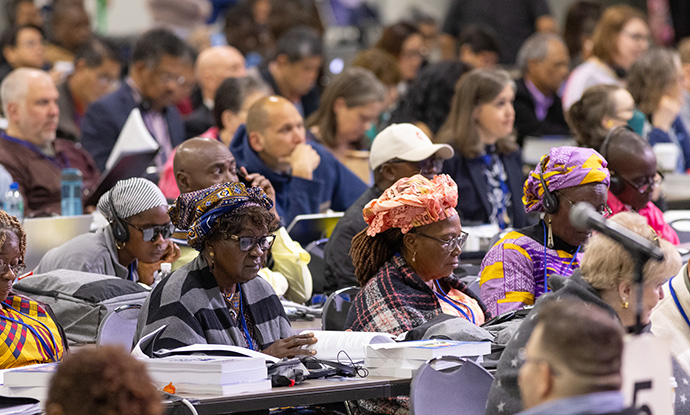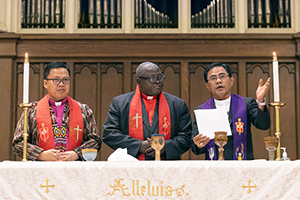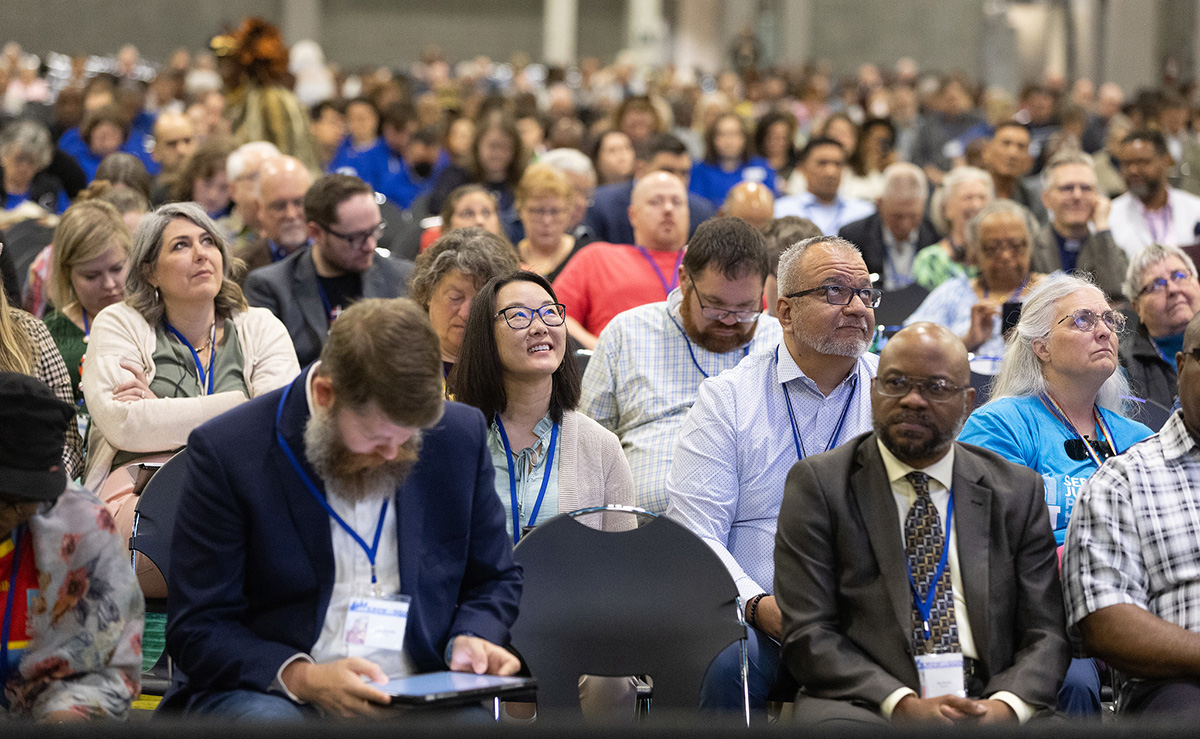Key Points:
- General Conference delegates approved the first batch of revised Social Principles, including an affirmation of the basic rights of all people regardless of sexual orientation or gender identity.
- This particular group of Social Principles offers the United Methodist social witness on government responsibilities and human rights.
- More Social Principles are coming up for a vote next week by the full General Conference plenary.
The United Methodist Church now proclaims its support “for the equal rights, liberties, and protections of all people, regardless of sexual orientation or gender identity.”
During the morning plenary, General Conference delegates approved that statement as part of the first batch of revised Social Principles to come before the body.
The United Methodist Church and its predecessors have long taken public stands on issues of the world going back to the 1908 Social Creed, which called for “equal rights and complete justice for all men in all stations of life.”
But this marks the first time that the denomination is calling for human rights no matter a person’s gender identity. By that, the Social Principle means people should be treated with basic human dignity regardless of whether they are male, female, intersexual, transgender or nonbinary.
“For a long time in The United Methodist Church and in our Social Principles, we’ve had a statement and consensus for many years, that all people are of sacred worth and that their civil and basic human rights should be respected and protected. This just clarifies and adds gender identity to that,” said Randall Miller.
He chaired the Social Principles Task Force that led the development of the revisions and served on the Social Principles writing team.
“All around the world, we're seeing people who are trans or nonbinary or who have a diversity in terms of their gender identity be persecuted, be discriminated against both legally and in practical terms,” Miller added. “This is a really crucial statement about the sacred worth of all people, and the honoring of basic civil and human rights for all people, including those of various gender identities.”

General Conference passed revised Social Principles dealing with “Church and Governments” and “Basic Rights and Freedoms” — alongside nine other pieces of legislation — on the consent calendar. The vote tally was 671 to 57, passing with 92%.
The consent calendar offers a way for General Conference delegates to approve multiple petitions in bulk. To make it onto the consent calendar, petitions must receive overwhelming support in their legislative committee and have no financial or constitutional implications.
Subscribe to our
e-newsletter
The Church and Society 3 legislative committee passed this batch unanimously and sent the legislation on to the full plenary without any changes to what the United Methodist Board of Church and Society — the denomination’s social-witness agency — submitted.
This is only the beginning. More revised Social Principles — including ones dealing with the church’s teachings on creation care, human sexuality and marriage — will be coming before General Conference delegates for a vote next week.
That includes a proposal that, if approved, would remove the denomination’s 52-year-old statement that “the practice of homosexuality… is incompatible with Christian teaching.”
What General Conference passed on April 27 replaces the Social Principles in Paragraphs 164 and 165 of the Book of Discipline, which contains the denomination’s policies and church teachings.
The Social Principles are not church law. Instead, they are intended to represent “the prayerful and earnest efforts of the General Conference to speak to issues in the contemporary world from a sound biblical and theological foundation.”
In addition to affirming the basic human rights of all people, the revised Social Principles passed on April 27:
- Reject governmental use of threats, extortion, unlawful detentions, extrajudicial killings and other forms of coercion to silence political opponents.
- Speak out against slavery, torture, genocide and war crimes.
- Reaffirm the longtime opposition to the death penalty proclaimed by The United Methodist Church and its predecessors.
- Commit to fair and proportional sentencing and to the humane treatment of those who are imprisoned, while insisting on accountability.
- Support civil disobedience in protest of “unjust or immoral laws.”
- Deplore war and all other forms of violent conflict and support people who follow the nonviolent example of Jesus.
- Also support people who choose military service as a result of personal conviction and urge “that they perform their duties in harmony with the tenets of the Christian faith and in accordance with the laws of the Geneva Conventions.”
- Affirm health care as a basic human right.
- Call on church and society to support and advocate for the well-being of all children and young people.
- Support the rights of Indigenous, native and aboriginal communities.
- Affirm the dignity, worth and rights of migrants, immigrants and refugees, including displaced and stateless people.
“We oppose all laws and policies that attempt to criminalize, dehumanize, or punish displaced individuals and families based on their status as migrants, immigrants, or refugees,” the revised Social Principle says.
The proposal for an entirely revised slate of Social Principles is the result of a multiyear and international process. The 2012 General Conference authorized the effort to make the Social Principles “more globally relevant, theologically founded and succinct.”
The Board of Church and Society carried out that effort with a writing team of 52 United Methodists from Africa, Europe, the Philippines and the U.S., who drafted the proposed revised Social Principles. That draft then received input from more than 4,000 United Methodists worldwide before the final submission.
Hahn is assistant news editor for UM News. Contact her at (615) 742-5470 or newsdesk@umnews.org. To read more United Methodist news, subscribe to the free daily or weekly Digests.





